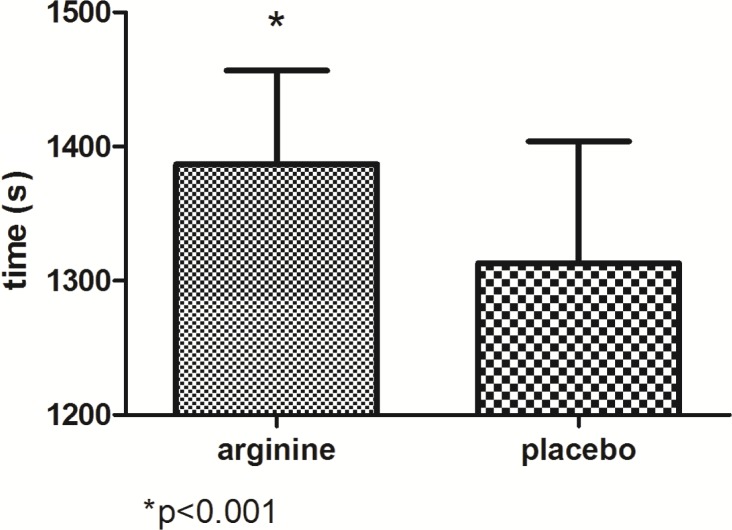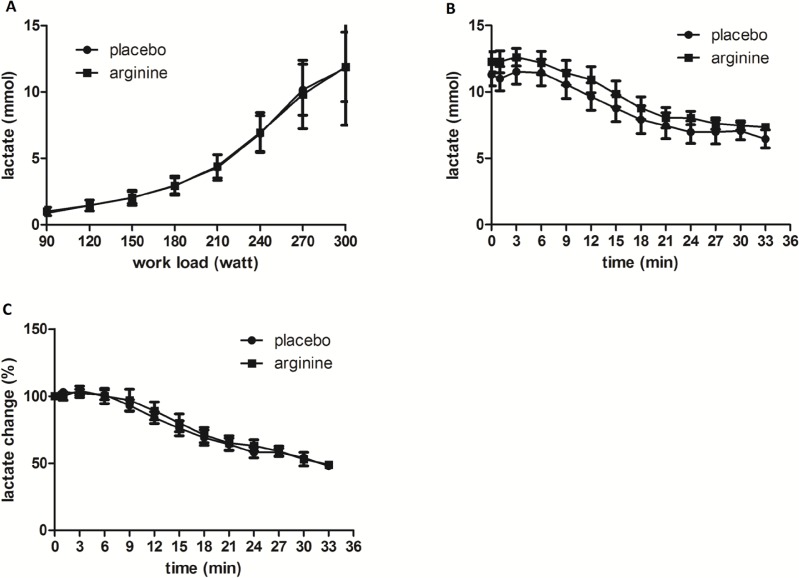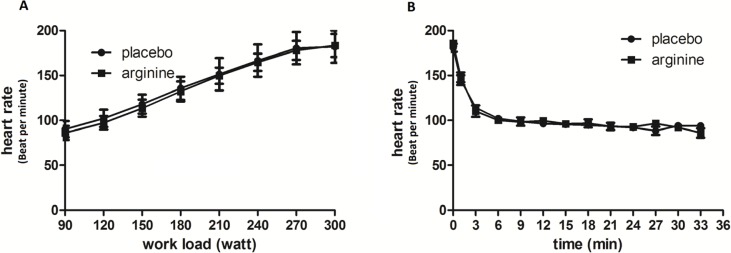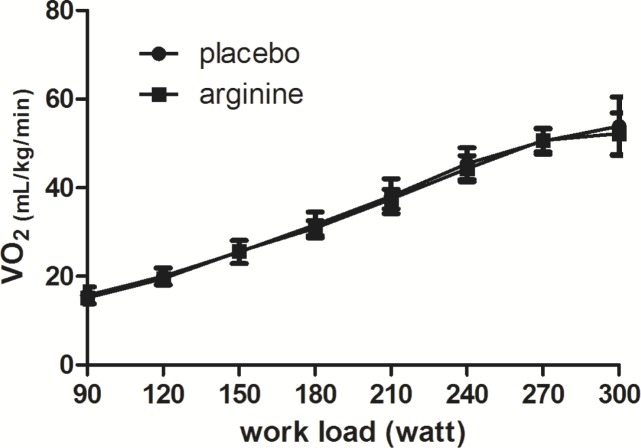Abstract
Dietary supplements containing arginine are among the most popular ergogenics intended to enhance strength, power and muscle recovery associated with both anaerobic and aerobic exercise. The aim of the present study was to evaluate the possible effect of pre-exercise acute intake of arginine on performance and exercise metabolism during incremental exhaustive exercise in elite male wrestlers. Nine volunteer elite male wrestlers (24.7±3.8 years) participated in this study. The test-retest protocol was used on the same subjects. The study was conducted using a cross-over design. A single dose of arginine (1.5 g · 10 kg-1 body weight) or placebo was given to the subjects after 12 hours fasting (during the night) for both test and retest. Subjects were allowed to drink water but not allowed to eat anything between arginine or placebo ingestion and the exercise protocol. An incremental exercise protocol was applied and oxygen consumption was measured during the exercise. Heart rate and plasma lactate levels were measured during the exercise and recovery. Results showed that in the same working loads there was no significant difference for the mean lactate levels and no difference in maximum oxygen consumption (arginine 52.47±4.01 mL · kg-1 · min-1, placebo 52.07±5.21 mL · kg-1 · min-1) or in maximum heart rates (arginine 181.09±13.57 bpm, placebo 185.89±7.38 bpm) between arginine and placebo trials. Time to exhaustion was longer with arginine supplementation (1386.8±69.8 s) compared to placebo (1313±90.8 s) (p < 0.05). These results suggest that L-arginine supplementation can have beneficial effects on exercise performance in elite male wrestlers but cannot explain the metabolic pathways which are responsible from these effects.
Keywords: arginine, performance, incremental exercise, elite, wrestling, time to exhaustion
INTRODUCTION
Amino acids are among the most common nutritional supplements taken by athletes. They are involved in numerous metabolic pathways that affect exercise metabolism [7]. Dietary supplements containing arginine are among the most popular ergogenics intended to enhance strength, power and muscle recovery associated with both anaerobic and aerobic exercise [2]. Arginine administration has been claimed to promote an increase in blood perfusion in the active muscle [22], increasing substrates necessary for improving muscular recovery and protein synthesis during and/or after exercise. Arginine supplementation could also improve exercise capacity by decreasing lactate accumulation, which has been shown to be involved in the development of muscular fatigue by increasing muscular acidity [4, 14, 25].
Despite the potential positive effects of arginine supplementation on exercise metabolism, it is still premature to recommend dietary supplements containing arginine as an ergogenic aid for healthy physically active subjects as several review analyses have emphasized [2, 8, 17, 21].
There are only a few acute studies regarding arginine supplementation and exercise performance, some of which showed positive effects of arginine supplementation on exercise metabolism [3, 6, 26] while the others showed no effect [19, 20]. As emphasized by McConnel [21], interpretation of these controversial results is difficult, since oral supplementation of arginine was used in combination with various other metabolites/salts in several studies. Therefore, there is a need for further research, especially to understand the mechanisms of how arginine affects exercise metabolism.
Since arginine could increase exercise-induced vasodilatation and remove the metabolites that may inhibit exercise performance, we asked whether the pre-exercise acute intake of arginine enhances performance during incremental exhaustive exercise in elite male wrestlers.
MATERIALS AND METHODS
Subjects
Nine male national and international level wrestlers were included in the study. Wrestling is a sport that requires strength and power and improved time to exhaustion may increase the actual performance. Since the resting times are limited between consecutive matches it could be beneficial if the recovery is improved. Key exclusion criteria included consuming any ergogenic supplement in the last 2 months, smoking, a history of coronary heart disease, or any prior or current medical problems that would limit the subject's physical performance. The participants were apparently healthy and free of any significant medical problems. They were also not taking any medications during the time of the study.
Written informed consent was obtained from each subject, and the study protocol was approved by the Human Ethical Committee of Hacettepe University, Ankara, Turkey. All procedures followed in this study were in accordance with the Helsinki Declaration of 1975, as revised in 2008.
Study design
The study was carried out according to a crossover design and lasted two weeks including a wash-out period of one week. The athletes performed an incremental bicycle ergometer test to exhaustion. Half of the athletes ingested the placebo before the first, and the other half before the second exercise protocol (test-retest protocol). The athletes followed their habitual eating and training patterns during the whole study. The subjects were advised to eat qualitatively the same carbohydrate-rich meals for dinner the day before the test and not to eat during the night (overnight fasting). Caffeine, alcohol, and dairy products were not allowed in the evening before the testing day. No physical activity was allowed the day prior to the tests. All exercises were done in the same laboratory and same temperature and humidity conditions. Water intake was not allowed during the exercise protocol. Subjects were randomly assigned to the arginine or placebo trial separated by a 7-day washout period. Arginine trial subjects consumed a single dose of 1.5 g · 10 kg-1 body weight arginine capsules (General Nutrition, Pittsburgh, PA, USA) after an overnight fast and waited for sixty minutes for the arginine peak in plasma [15]. Placebo trial subjects consumed an equal number of capsules containing starch. Subjects were not allowed to eat anything between arginine or placebo ingestion and the exercise protocol but were allowed to drink water.
Exercise protocol
Subjects started to warm up at 60 rpm on a Monark cycle ergometer (894E, Monark, Varberg, Sweden) without any load, and after 3 minutes the exercise protocol started at 90 watts and the load was increased by 30 watts every 3 minutes. Subjects were asked to maintain 60-70 rpm during the whole protocol. Exercise was continued until the subjects could not go on cycling 60-70 rpm at the desired working loads or the subjects wanted to stop. Gas exchange was continuously measured by an online automatic breath-by-breath gas analyser (Quark b2, Cosmed, Rome, Italy). At the end of each stage, 25 L of blood was drawn from the ear lobe, and immediately analysed to determine blood lactate concentration (YSI 1500 Sport, Yellow Springs Instruments, Yellow Springs, Ohio). The metabolic unit and the lactate analyser were regularly calibrated according to the manufacturer's instructions. At the end of each testing session, the data stored in the Cosmed Quark b2 unit were downloaded to a laptop using the manufacturer's software (Cosmed, Data Management Software, Version 7.3a). Breath-by-breath data were averaged over 5-s time intervals and subsequently imported into an Excel spreadsheet for further analyses. A wireless chest strap telemetry system (Polar Electro T31, Kempele, Finland) continuously recorded heart rate during the exercise test and in the recovery period. Lactate analysis and heart rate monitoring were continued in the recovery period until the measured lactate levels decreased to 50% of the initial lactate levels of recovery. Lactate levels and heart rates were measured immediately after the exercise (0 minute of recovery), 1 minute after exercise, 3 minutes after exercise and at every 3 minutes after that.
Statistics
The statistical comparison of the ratios between placebo and arginine trials was made using the T-test for dependent samples. The level of significance was set at p < 0.05. Data in text and figures are presented as mean and 95% confidence interval of the mean.
RESULTS
Effects of arginine supplementation on the lactate metabolism, oxygen consumption and heart rate were measured during the incremental exercise to exhaustion and during recovery of nine elite male wrestlers; the age, height and weight means of the subjects were as follows: 24.7±3.8 years old, 174.2±5.2 cm and 80.4±4.1 kg. Time to exhaustion increased by 5.8% in the arginine trial (1386.8±69.8 s) compared to the placebo trial (1313±90.8 s) (p < 0.001) (Figure 1).
FIG. 1.
TIME TO EXHAUSTION IN INCREMENTAL EXERCISE FOR ARGININE AND PLACEBO TRIALS
Note: * significantly different at p < 0.001
There was no significant difference in lactate concentrations between arginine and placebo trials either for any working load or at any point during recovery (Figure 2). Lactate concentrations taken immediately before the exercise (during resting) were also similar for placebo and arginine trials (0.89±0.18, 1.01±0.31; respectively). Although it was not statistically significant (p > 0.05), the lactate level measured immediately after the exercise (0 minute during recovery) was slightly higher in the arginine trial (12.26±2.27 mmol) than in the placebo trial (11.29±2.53 mmol). Therefore we decided to compare the % change in lactate concentrations during recovery and did not find any difference at any point of recovery (Figure 2).
FIG. 2.
LACTATE CONCENTRATIONS AT DIFFERENT WORKING LOADS DURING INCREMENTAL EXERCISE AND LACTATE CONCENTRATIONS AND % CHANGE IN LACTATE CONCENTRATIONS DURING RECOVERY AFTER EXERCISE IN ARGININE AND PLACEBO TRIALS
There was also no statistically significant difference in maximum heart rate (placebo, 181.1±13.6; arginine, 185.9±7.4) or maximum oxygen consumption (placebo, 52.07±5.21 mL · kg-1 · min-1; arginine, 52.47±4.01 mL · kg-1 · min-1) between the two trials (p > 0.05).
No difference was found in heart rates during the exercise protocol or during recovery (Figure 3).
FIG. 3.
HEART RATES AT DIFFERENT WORKING LOADS DURING INCREMENTAL EXERCISE AND HEART RATES DURING RECOVERY AFTER EXERCISE IN PLACEBO AND ARGININE TRIALS
Oxygen consumption did not show any difference between placebo and arginine trials (Figure 4).
FIG. 4.
OXYGEN CONSUMPTIONS AT DIFFERENT WORKING LOADS DURING INCREMENTAL EXERCISE IN PLACEBO AND ARGININE TRIALS
DISCUSSION
The present study was designed to determine the effect of a single dose of arginine supplementation on exercise metabolism and performance during an incremental exercise bout to exhaustion. The results of this study did not show any significant difference in oxygen consumption during the exercise, lactate concentrations and heart rate during and after the exercise between trials. However, compared to placebo, time to exhaustion increased with arginine supplementation. Recent reports suggest that dietary L-arginine supplementation does not influence the steady-state O2 cost of moderate-intensity cycle exercise [18] or submaximal treadmill running [5]. On the other hand, Bailey et al. [3] reported that acute arginine supplementation resulted in a reduced O2 cost of moderate-intensity cycle exercise, along with reduced VO2 slow component amplitude and improved time to task failure during severe-intensity exercise. Nevertheless, maximum VO2 did not show any difference between arginine and placebo. We did not observe any statistically significant difference either in maximum VO2 or the oxygen consumptions for any given work load in arginine and placebo trials; and the study was not designed to determine the VO2 slow component amplitude.
No statistically significant difference in lactate concentrations was observed at any given workload during exercise between arginine and placebo groups. Although these results differ from some published studies [12, 13, 24], they are consistent with those of Stevens et al. [26], Buford et al. [6], Abel et al. [1], Liu et al. [19], Koppo et al. [18], Tsai et al. [27] and Bailey et al. [3]. The differences between the studies may have resulted from the way of administration of arginine or the combination of arginine with other components. Arginine was given intravenously in the study of Schaefer et al. [24] and combined with aspartate [12] and glutamate [13] in different studies. We also measured the lactate concentrations during post exercise recovery. Since the time to exhaustion is longer in the arginine trial, the lactate levels measured immediately after the exercise (0 minute during recovery) was slightly higher in the arginine trial, even though it was not statistically significant. That is why we compared the % change in lactate concentrations during recovery and did not find any difference at any point of recovery between arginine and placebo groups. This finding is in agreement with previous findings which showed no difference between arginine or placebo ingestion in lactate levels after a single bout of exercise at 75% of max VO2 for 60 minutes [27] and after simulated wrestling match performance [16].
The results of studies with arginine supplementation on performance are rather inconsistent. Stevens et al. [26] showed that oral glycine-arginine-alpha-ketoisocaproic acid (GAKIC) increased muscle torque and work sustained during intense acute anaerobic dynamic exercise and increased overall muscle performance by delaying muscle fatigue during the early phases of anaerobic dynamic exercise. Buford and Koch [6] observed a statistically significant increase in peak power output in repeated cycling sprints with glycine-arginine-alpha-ketoisocaproic acid supplementation. Campbell et al. [9] reported an increase in 1RM bench press and peak power performance with arginine alpha-ketoglutarate (AAKG) in trained adult men. Bailey et al. [3] observed an increased time to task failure during intense exercise with 3 consecutive days of arginine supplementation which also contained trace amounts of vitamins, other amino acids and fructose at a dose supposedly that would not be expected to elicit performance gains. This is in accordance with our finding of an increased time to task failure with arginine supplementation. On the other hand, there are studies showing no difference in intermittent anaerobic exercise performance [19], marathon running performance [11], cycling exercise performance [20] and time to exhaustion [23] with arginine supplementation. Despite the increasing number of studies in arginine supplementation, the effect on exercise metabolism and performance is still unclear. Many studies have shown different results and there are several possible factors that may cause this variability of the results. The shorter [3, 19, 20, 23, 27] or the longer period of supplementation [1, 10, 11, 18]; combination of arginine with different components [1, 6, 9–13, 26]; different doses of arginine; different exercise protocols; different fitness levels of subjects (endurance trained athletes [1, 10, 11, 20], physically active healthy men [3, 18, 23], combat sports athletes [16, 27], etc. ) are some of the factors that may cause inconsistent results of the studies.
A limitation of the present study was that the markers of nitric oxide bioavailability were not measured. NO was supposed to improve exercise efficiency and exercise tolerance in healthy humans and increased with arginine supplementation [3].
CONCLUSIONS
Acute dietary supplementation with 1.5 g · 10 kg-1 (body weight) of arginine did not change the oxygen consumption during maximal incremental exercise and did not change lactate concentration and heart rate during exercise and post-exercise recovery in elite male wrestlers. However, it caused a 5.8% increase in time to exhaustion during maximal incremental exercise. Due to the nature of maximal incremental exercise, even a relatively small change in time to exhaustion is likely to be meaningful for athletic performance. These results suggest that L-arginine supplementation can have beneficial effects on exercise performance in elite male wrestlers. The precise mechanisms responsible for the increase in time to exhaustion remain to be elucidated. Further research is needed to understand the role of arginine supplementation in different types of exercise performance in athletes before definitive conclusions can be drawn regarding its potential ergogenic value.
Declaration of interest
The authors report no conflict of interest.
REFERENCES
- 1.Abel T, Knechtle B, Perret C, Eser P, von Arx P, Knecht H. Influence of chronic supplementation of arginine aspartate in endurance athletes on performance and substrate metabolism — a randomized, double-blind, placebo-controlled study. Int. J. Sports Med. 2005;26:344–349. doi: 10.1055/s-2004-821111. [DOI] [PubMed] [Google Scholar]
- 2.Alvares T.S, Meirelles C.M, Bhambhani Y.N, Paschoalin V.M, Gomes P.S. L-Arginine as a potential ergogenic aid in healthy subjects. Sports Med. 2011;41:233–48. doi: 10.2165/11538590-000000000-00000. [DOI] [PubMed] [Google Scholar]
- 3.Bailey S.J, Winyard P.G, Vanhatalo A, Blackwell J.R, DiMenna F.J, Wilkerson D.P, Jones A.M. Acute L-arginine supplementation reduces the O2 cost of moderate-intensity exercise and enhances high-intensity exercise tolerance. J. Appl. Physiol. 2010;109:1394–1403. doi: 10.1152/japplphysiol.00503.2010. [DOI] [PubMed] [Google Scholar]
- 4.Bangsbo J, Madsen K, Kiens B, Richter E.A. Effect of muscle acidity on muscle metabolism and fatigue during intense exercise in man. J. Physiol. 1996;495:587–96. doi: 10.1113/jphysiol.1996.sp021618. [DOI] [PMC free article] [PubMed] [Google Scholar]
- 5.Bescós R, Gonzalez-Haro C, Pujol P, Drobnic F, Alonso E, Santolaria M.L, Ruiz O, Esteve M, Galilea P. Effects of dietary L-arginine intake on cardiorespiratory and metabolic adaptation in athletes. Int. J. Sport Nutr. Exerc. Metab. 2009;19:355–65. doi: 10.1123/ijsnem.19.4.355. [DOI] [PubMed] [Google Scholar]
- 6.Buford B.N, Koch A.J. Glycine-arginine-alpha-ketoisocaproic acid improves performance of repeated cycling sprints. Med. Sci. Sports Exerc. 2004;36:583–587. doi: 10.1249/01.mss.0000122075.14060.c4. [DOI] [PubMed] [Google Scholar]
- 7.Burtscher M, Brunner F, Faulhaber M, Hotter B, Likar R. The prolonged intake of L-arginine L-aspartate reduces blood lactate accumulation and oxygen consumption during submaximal exercise. J. Sports Sci. Med. 2005;4:314–22. [PMC free article] [PubMed] [Google Scholar]
- 8.Campbell B.I, La Bounty P.M, Roberts M. The Ergogenic Potential of Arginine. J. Int. Soc. Sports Nutr. 2004;1:35–38. doi: 10.1186/1550-2783-1-2-35. [DOI] [PMC free article] [PubMed] [Google Scholar]
- 9.Campbell B, Roberts M, Kerksick C, Wilborn C, Marcello B, Taylor L, Nassar E, Leutholtz B, Bowden R, Rasmussen C, Greenwood M, Kreider R. Pharmacokinetics, safety, and effects on exercise performance of L-arginine alpha-ketoglutarate in trained adult men. Nutrition. 2006;22:872–81. doi: 10.1016/j.nut.2006.06.003. [DOI] [PubMed] [Google Scholar]
- 10.Chen S, Kim W, Henning S.M, Carpenter C.L, Li Z. Arginine and antioxidant supplement on performance in elderly male cyclists: a randomized controlled trial. J. Int. Soc. Sports Nutr. 2010;23:7–13. doi: 10.1186/1550-2783-7-13. [DOI] [PMC free article] [PubMed] [Google Scholar]
- 11.Colombani P.C, Bitzi R, Frey-Rindova P, Frey W, Arnold M, Langhans W, Wenk C. Chronic arginine aspartate supplementation in runners reduces total plasma amino acid level at rest and during a marathon run. Eur. J. Nutr. 1999;38:263–270. doi: 10.1007/s003940050076. [DOI] [PubMed] [Google Scholar]
- 12.Denis C, Dormois D, Linossier M.T, Eychenne J.L, Hauseux P, Lacour J.R. Effect of arginine aspartate on the exercise-induced hyperammoniemia in humans: a two periods cross-over trial. Arch. Int. Physiol. Biochim. Biophys. 1991;99:123–27. doi: 10.3109/13813459109145914. [DOI] [PubMed] [Google Scholar]
- 13.Eto B, Peres G, Le Moel G. Effects of an ingested glutamate arginine salt on ammonemia during and after long lasting cycling. Arch. Int. Physiol. Biochim. Biophys. 1994;102:161–62. doi: 10.3109/13813459409007530. [DOI] [PubMed] [Google Scholar]
- 14.Favero T.G, Zable A.C, Colter D, Abramson J.J. Lactate inhibits Ca(2+)-activated Ca(2+)-channel activity from skeletal muscle sarcoplasmic reticulum. J. Appl. Physiol. 1997;82:447–52. doi: 10.1152/jappl.1997.82.2.447. [DOI] [PubMed] [Google Scholar]
- 15.Gannon M.C, Nuttall J.A, Nuttall F.Q. Oral arginine does not stimulate an increase in insulin concentration but delays glucose disposal. Am. J. Clin. Nutr. 2002;76:1016–22. doi: 10.1093/ajcn/76.5.1016. [DOI] [PubMed] [Google Scholar]
- 16.Jang T.R, Wu C.L, Chang C.M, Hung W, Fang S.H, Chang C.K. Effects of carbohydrate, branched-chain amino acids, and arginine in recovery period on the subsequent performance in wrestlers. J. Int. Soc. Sports Nutr. 2011;22:8–21. doi: 10.1186/1550-2783-8-21. [DOI] [PMC free article] [PubMed] [Google Scholar]
- 17.Knechtle B, Bosch A. The influence of arginine supplementation on performance and metabolism in athletes. Int. Sportmed. J. 2008;9:22–31. [Google Scholar]
- 18.Koppo K, Taes Y.E, Pottier A, Boone J, Bouckaert J, Derave W. Dietary arginine supplementation speeds pulmonary VO2 kinetics during cycle exercise. Med. Sci. Sports. Exerc. 2009;41:1626–32. doi: 10.1249/MSS.0b013e31819d81b6. [DOI] [PubMed] [Google Scholar]
- 19.Liu T.H, Wu C.L, Chiang C.W, Lo Y.W, Tseng H.F, Chang C.K. No effect of short-term arginine supplementation on nitric oxide production, metabolism and performance in intermittent exercise in athletes. J. Nutr. Biochem. 2009;20:462–468. doi: 10.1016/j.jnutbio.2008.05.005. [DOI] [PubMed] [Google Scholar]
- 20.McConell G.K, Huynh N.N, Lee-Young R.S, Canny B.J, Wadley G.D. L-Arginine infusion increases glucose clearance during prolonged exercise in humans. Am. J. Physiol. Endocrinol. Metab. 2006;290:60–66. doi: 10.1152/ajpendo.00263.2005. [DOI] [PubMed] [Google Scholar]
- 21.McConell G.K. Effects of L-arginine supplementation on exercise metabolism. Curr. Opin. Clin. Nutr. Metab. Care. 2007;10:46–51. doi: 10.1097/MCO.0b013e32801162fa. [DOI] [PubMed] [Google Scholar]
- 22.Rector T.S, Bank A.J, Mullen K.A, Tschumperlin L.K, Sih R, Pillai K, Kubo S.H. Randomized, double-blind, placebo-controlled study of supplemental oral L-arginine in patients with heart failure. Circulation. 1996;93:2135–41. doi: 10.1161/01.cir.93.12.2135. [DOI] [PubMed] [Google Scholar]
- 23.Sales R.P, Miné C.E.C, Franco A.D, Rodrigues E.L, Pelogia N.C.C, Silva R de.S, Cogo J.C, Lopes Martins R.A.B, Osorio R.L, Ribeiro W. Effects of the acute arginine aspartate supplement on the muscular fatigue in trained volunteers. Rev. Bras. Med. Esporte. 2005;11:347–351. [Google Scholar]
- 24.Schaefer A, Piquard F, Geny B, Doutreleau S, Lampert E, Mettauer B, Lonsdorfer J. L-Arginine reduces exercise-induced increase in plasma lactate and ammonia. Int. J. Sports. Med. 2002;23:403–07. doi: 10.1055/s-2002-33743. [DOI] [PubMed] [Google Scholar]
- 25.Spodaryk K, Szmatlan U, Berger L. The relationship of plasma ammonia and lactate concentrations to perceived exertion in trained and untrained women. Eur. J. Appl. Physiol. Occup. Physiol. 1990;61:309–12. doi: 10.1007/BF00357618. [DOI] [PubMed] [Google Scholar]
- 26.Stevens B.R, Godfrey M.D, Kaminski T.W, Braith R.W. High-intensity dynamic human muscle performance enhanced by a metabolic intervention. Med. Sci. Sports Exerc. 2000;32:2102–08. doi: 10.1097/00005768-200012000-00021. [DOI] [PubMed] [Google Scholar]
- 27.Tsai P.H, Tang T.K, Juang C.L, Chen K.W, Chi C.A, Hsu M.C. Effects of arginine supplementation on post-exercise metabolic responses. Chin. J. Physiol. 2009;52:136–42. doi: 10.4077/cjp.2009.amh037. [DOI] [PubMed] [Google Scholar]






